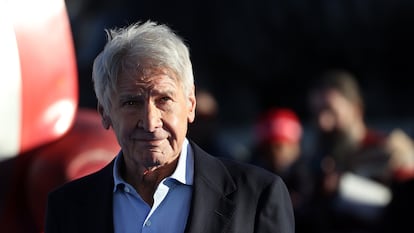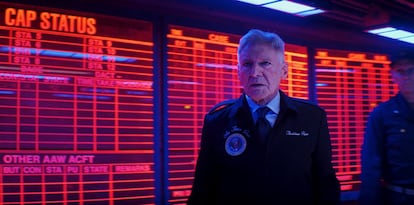Harrison Ford plays a president-turned-monster, but avoids discussing Trump
The actor, who stars in the film ‘Captain America: Brave New World,’ prefers to avoid talking about U.S. politics

There are comparisons that are inevitable. In the new installment of the adventures of Captain America, Captain America: Brave New World, produced by Marvel Studios and directed by Julius Onah, Harrison Ford once again plays a U.S. president. But in this case, the character is the legendary Thaddeus E. “Thunderbolt” Ross, a comic book antihero who becomes Red Hulk, a huge red (more like orange?) monster who faces the superhero.
— It’s difficult to avoid falling into the trap of comparing presidents…
“I’m gonna help you,” Ford interrupts with a half-smile that reveals the limits of his patience during the interview. “This president compares to none. There is no reference [in the film] to presidential realities. This is a fiction, based on established Marvel characters. Bill Hurt [the late actor William Hurt] created the character that I’m playing. It’s a world full of imagination and solutions that are not potentially available in real life.”
Ford gave a 20-minute interview to EL PAÍS in a luxury London hotel room as part of the promotion campaign for the new film. There are no mandatory conditions regarding the subject of the questions, which the newspaper, on the other hand, would not have accepted. But it is true that the production company had previously “kindly requested” that the focus of the interview revolve around the movie.
— What values should a U.S. president have? What values do you expect from someone who holds that office?
— Respect for the history of the country. Attendance to the virtues of the country. And good judgment.
— And does the current president of the United States possess these virtues?
It is at this point the interview takes a much more tense and complicated turn. The head of the communications agency that has arranged the meeting and is supervising it, sitting a few meters away from the actor, tries to stop the line of inquiry. “Sorry, we just have to keep to…”
Ford — with the voice and authority he has accrued over the years — cuts short any attempt to control the conversation. “No, let me do it. Thank you,” he says, while extending his palm toward the executive to silence him. “That’s not the nature of this interview for me to talk about the reality of politics. I’m here to talk about a movie, about a fiction. About an entertainment”
— I imagine, in any case, that you are aware of what your image represents around the world and that any European journalist would be tempted to ask you...
— I’m very much aware, sir. I really respect your journalistic responsibilities and the opportunity you have. I’m not going to let you take advantage of that.
Disarmed. It is really hard to be persistent with an icon who has that voice and that look of authority, to which we have become accustomed over the decades through Ford’s body of work. Someone who is a meter away from you, sitting face to face, and who continues to smile while suggesting that you continue the interview in a different way, or that you should end it.
So, faced with a legend, the conversation leaves the world of politics and returns to that of cinema, where Ford continues to work even though he doesn’t really need to, and despite the golden era that made him a universal star appearing to be in the past. “It’s changed. I’ve changed. I don’t think that’s my call. We always look back with affection on the things of the past. We forget the complications that we faced. Certainly, it’s a different world that we’re in now, but, the things that maintain us, the things that engage us, are the complications of human relationships,” he explains.

In recent years, Ford has made a successful move into the world of television. He plays therapist Paul Rhoades in the comedy Shrinking and the patriarch of the Duttons, a Montana ranching family, in 1923, the prequel to Yellowstone, starring Kevin Costner.
“I think the kinds of writing that I’m choosing to be involved in is amongst the best writing that I’ve seen in a long time,” the actor says. “It’s not television we’re making. We’re making movies that are 10 hours long, and they’re chopped into 10 pieces. The opportunity to develop a character and relationships in that context exceeds the usual breadth of a feature film, and it’s exciting to work that way.”
Ford is a man committed to his time, who regrets the current setbacks in the fight against climate change. He has historically supported the Democratic Party, but is above all a staunch defender of moderation and a middle path. That is why he once backed Republican John McCain, who represented an institutionality and sobriety that is now lost in U.S. politics. And he contributed to the Lincoln Project, a committee made up of Republicans and ex-Republicans that wanted to prevent Trump from being re-elected in 2020.
He doesn’t buy the idea, propagated by the American right, that committed and risky films like Francis Ford Coppola’s Apocalypse Now, in which he was involved, would not have been possible in the current era of the dictatorship of political correctness. “If there were a Francis Coppola, if there was the writing that was involved in Apocalypse, if there was a cultural moment to deal with the residue of the Vietnam experience, and make art out of it, yeah. Things are always changing, and they’re always the same,” he says ironically.
He endorsed the Democratic candidate, Kamala Harris, in last year’s presidential election. He defended her moderation in the face of her rival’s thirst for revenge. But Trump has returned to the White House. And for the moment, Indiana Jones, Han Solo, and even Dr. Richard Kimble from The Fugitive do not seem to want to be dragged into any controversy. In the hotel hallway, while the journalist is packing his things and putting on his coat, Ford passes by with his PR entourage. He stops, extends his hand, and says goodbye again without losing his smile: “Good luck,” he says, without making it clear whether this is irony, complicity, or mere courtesy.
Sign up for our weekly newsletter to get more English-language news coverage from EL PAÍS USA Edition
Tu suscripción se está usando en otro dispositivo
¿Quieres añadir otro usuario a tu suscripción?
Si continúas leyendo en este dispositivo, no se podrá leer en el otro.
FlechaTu suscripción se está usando en otro dispositivo y solo puedes acceder a EL PAÍS desde un dispositivo a la vez.
Si quieres compartir tu cuenta, cambia tu suscripción a la modalidad Premium, así podrás añadir otro usuario. Cada uno accederá con su propia cuenta de email, lo que os permitirá personalizar vuestra experiencia en EL PAÍS.
¿Tienes una suscripción de empresa? Accede aquí para contratar más cuentas.
En el caso de no saber quién está usando tu cuenta, te recomendamos cambiar tu contraseña aquí.
Si decides continuar compartiendo tu cuenta, este mensaje se mostrará en tu dispositivo y en el de la otra persona que está usando tu cuenta de forma indefinida, afectando a tu experiencia de lectura. Puedes consultar aquí los términos y condiciones de la suscripción digital.









































